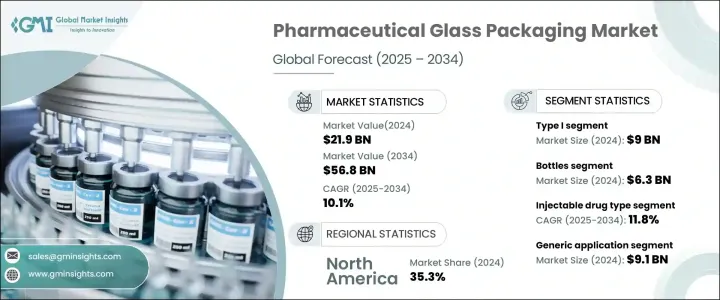
세계의 의약품용 유리 포장 시장은 2024년에 219억 달러로 평가되었으며, 2025년부터 2034년까지 연평균 복합 성장률(CAGR) 10.1%를 나타낼 것으로 예측됩니다.
시장의 급성장은 의약품의 안전성과 무결성을 보장하는 엄격한 규제 요건과 함께 세계의 의약품 수요 증가가 원동력이 되고 있습니다.

생물제제, 백신, 주사제의 채용이 증가하고 있기 때문에 특수한 유리 포장, 특히 화학적 상호작용이나 열변동에 대하여 비교할 수 없는 보호를 제공하는 유형 1의 붕규산 유리에 대한 요구가 더욱 높아지고 있습니다. 맞춤형 의료나 세포 및 유전자 치료로의 변화도, 고가치 의약품이나 복잡한 생물 제제에 대응하는 혁신적이고 지속 가능한 유리 포장 솔루션의 개발을 제조업체에 촉진하고 있습니다.
| 시장 범위 | |
|---|---|
| 시작 연도 | 2024년 |
| 예측 연도 | 2025-2034년 |
| 시작 금액 | 219억 달러 |
| 예측 금액 | 568억 달러 |
| CAGR | 10.1% |
세계적으로 지속가능성에 대한 관심이 높아지는 가운데 제약회사는 환경친화적이고 재활용 가능한 대체 포장에 투자하고 있습니다. 의약품의 안정성과 보호에 대한 높은 기준을 유지하면서 운송 비용을 절감할 수 있는 경량 유리는 그 기세를 늘리고 있습니다. 아시아태평양을 중심으로 한 신흥 시장에서는 의약품 생산이 견조하게 성장하고 있으며, 제네릭 의약품과 브랜드 의약품 모두 유리 포장의 채용률이 높아지고 있습니다. 바이오시밀러의 상승과 엄격한 시리얼 규제는 제품의 추적성과 안전성을 보장하는 유리 포장에 대한 수요를 더욱 높여줍니다.
의약품용 유리 포장 시장은 주로 재료 유형별로 분류되며 유형 1 유리는 부문을 지배합니다. 2024년, 이 범주는 90억 달러를 차지했으며, 생물 제제, 백신 및 주사제의 보관에서 붕규산 유리 수요 증가에 기여했습니다. 유형 1 유리는 내약품성이 뛰어나 약제의 오염이나 열화를 방지하기 위해 널리 선호되고 있습니다. 섬세한 제형에 붕규산 유리의 사용을 의무화하는 엄격한 규제 지침을 실시함으로써 붕규산 유리 시장 수요는 계속 가속화되고 있습니다.
제품 유형별로 볼 때 바이알, 병, 인젝터, 앰플 및 기타 포장 형태가 있습니다. 많은 제제는 자외선 노출로부터 보호하기 위해 호박색 유리병을 필요로 하고, 특수한 의약품용 유리 포장 수요를 더욱 밀어 올리고 있습니다.
북미는 의약품용 유리 포장 시장에서 지배적인 지위를 유지하고 있으며, 미국은 2024년 68억 달러 시장 규모를 기록했습니다.
The Global Pharmaceutical Glass Packaging Market, valued at USD 21.9 billion in 2024, is projected to expand at a CAGR of 10.1% from 2025 to 2034. The surge in market growth is driven by the increasing demand for pharmaceuticals worldwide, coupled with stringent regulatory requirements ensuring drug safety and integrity. As the pharmaceutical industry seeks highly reliable and contamination-free packaging solutions, glass continues to gain traction due to its superior chemical resistance, durability, and non-reactive properties.

The rising adoption of biologics, vaccines, and injectables is further amplifying the need for specialized glass packaging, particularly Type 1 borosilicate glass, which offers unparalleled protection against chemical interactions and thermal fluctuations. Governments and regulatory bodies are reinforcing compliance with strict packaging standards, making glass the preferred choice for critical drug formulations. The shift toward personalized medicine and cell and gene therapies is also driving manufacturers to develop innovative and sustainable glass packaging solutions that cater to high-value drugs and complex biologics.
| Market Scope | |
|---|---|
| Start Year | 2024 |
| Forecast Year | 2025-2034 |
| Start Value | $21.9 Billion |
| Forecast Value | $56.8 Billion |
| CAGR | 10.1% |
With an increasing global focus on sustainability, pharmaceutical companies are investing in eco-friendly and recyclable packaging alternatives. Lightweight glass solutions are gaining momentum as they help reduce transportation costs while maintaining high standards for drug stability and protection. Emerging markets, particularly in Asia-Pacific, are experiencing robust growth in pharmaceutical production, leading to higher adoption rates for glass packaging in both generic and branded drugs. The rise of biosimilars and stringent serialization regulations further necessitate the demand for glass packaging, ensuring product traceability and safety.
The pharmaceutical glass packaging market is primarily categorized by material type, with Type 1 glass dominating the segment. In 2024, this category accounted for USD 9 billion, fueled by the increasing demand for borosilicate glass in the storage of biologics, vaccines, and injectable drugs. Type 1 glass is widely preferred due to its superior chemical resistance, preventing drug contamination and degradation. The implementation of strict regulatory guidelines that mandate the use of borosilicate glass for sensitive formulations continues to accelerate its market demand.
Based on product type, the market includes vials, bottles, syringes, ampoules, and other packaging formats. Bottles lead the segment, generating USD 6.3 billion in 2024, primarily due to the rising prevalence of chronic diseases that drive demand for liquid formulations such as syrups. Many of these formulations require amber-colored glass bottles to protect them from UV exposure, further boosting the demand for specialized pharmaceutical glass packaging. The industry is witnessing a shift toward lightweight glass bottles, which provide cost efficiency in logistics while maintaining recyclability and regulatory compliance.
North America remains a dominant force in the pharmaceutical glass packaging market, with the United States alone generating USD 6.8 billion in 2024. The country's highly advanced pharmaceutical sector, along with increasing production and exports of biologics and vaccines, continues to drive significant demand for high-quality glass packaging. With pharmaceutical manufacturers prioritizing safety, sustainability, and regulatory compliance, the U.S. is set to retain its position as a key contributor to the global market.